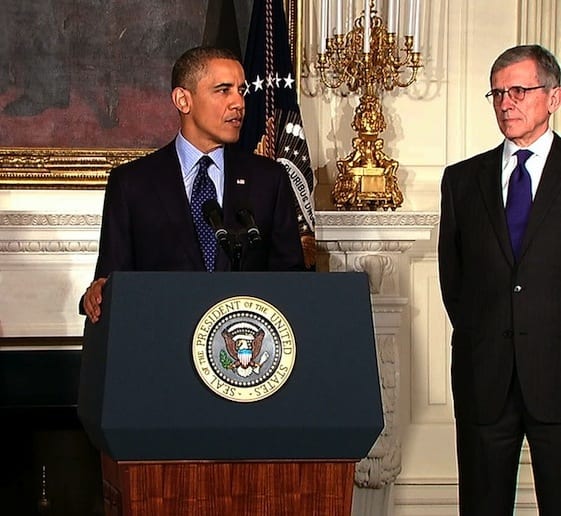
FCC Still Picking Winners and Losers in Spectrum Auction
Taxpayers Protection Alliance
July 25, 2014

The Taxpayers Protection Alliance (TPA) has been dogged in its fight against forms of cronyism that aim to give preferential treatment to certain groups or interests when it comes to issues including energy, defense, and telecom. One area in telecom where this has been blatant is in the upcoming spectrum auction (read previous TPA blogs on spectrum here and here) being handled by the Federal Communications Commission (FCC). The FCC is sitting on approximately $20 billion worth of spectrum (see TPA infographic here) that should be sold.
But, instead of keeping the sale process open and transparent, it appears the FCC is continuing their preferred policy of picking winners and losers in terms of who will get to bid for the valuable spectrum. The latest spectrum and crony capitalism news comes from Todd Shields and Jonathan D. Salant in a Bloomberg story earlier this week:
A private-equity company owned by a campaign donor to U.S. President Barack Obama won a waiver from the Federal Communications Commission that may help it bid in airwaves auctions.
Grain Management LLC may not have qualified for benefits reserved for small businesses because airwaves leases to AT&T Inc. and Verizon Communications Inc. caused it to exceed the program’s income limits, the company had said in an FCC filing. The agency has adopted a waiver, an FCC spokesman, Neil Grace, said yesterday in an e-mail without providing details.
The waiver will allow Grain Management LLC to participate in the spectrum auction this November, where 1,614 airwaves licenses for 65 MHz of airwaves will be up for grabs. The issue of the waiver, requested back in March, seems unseemly for several reasons, but two in particular have raised some concern. One, the proceedings on this waiver had not been made public. Second, the connection between David Grain and the current administration. According to a report in Businessweek:
David Grain contributed more than $60,000 to Obama’s presidential campaign and the Democratic National Committee in 2008, and $22,500 in 2012, Federal Election Commission filings show. He was also one of Obama’s top fundraisers for the 2008 election, bringing in $200,000 to $500,000, according to the campaign.
The FCC, led by Democratic Chairman Tom Wheeler, voted 3-to-2 along party lines behind closed doors July 21 to waive the rule, allowing the company to seek bidding credits that offer discounts on winning bids, according to people with knowledge of the vote who asked for anonymity because the proceedings hadn’t been made public.
There are many concerns that TPA and others, rightfully so, have with this situation. The questions of how a private proceeding at a government agency which led to the special treatment of a company run by a major party donor to the current administration are serious, and must be addressed. That being said, Mr. Grain has also donated to Representative James Clyburn, whose daughter Mignon Clyburn sits on the FCC and was one of the votes approving the waiver. This clear conflict of interest raises additional questions about the entire process.
The FCC is no stranger to controversy nor is it a stranger to picking winners and losers, specifically when looking at the spectrum auction process. Earlier this year, TPA expressed concern over the rules put in place for the incentive auction of spectrum and why the process needed to be open and encourage competition. Instead, the FCC made sure to put in place provisions that would guarantee certain outcomes, going against the idea of a fair and open process. The FCC has attached rules to the upcoming auction that are in direct conflict to what many groups and organizations supporting free market principles had hoped. The New York Post summed up the results of the vote:
In a 3-to-2 ruling, the FCC said bidders for much of the roughly $20 billion in spectrum coming up for sale cannot have as much spectrum as Verizon or AT&T presently have in most markets, including New York City.
The regulator also defined the parameters of what constitutes currently owned spectrum in such a way as to prevent Sprint, the No. 3 carrier, from participating in some of the auctions, sources said.
Now, months later we are seeing more preferential treatment being doled out in close votes, but now they are happening behind closed doors and with at least (some) appearance of impropriety. The FCC needs to do a better job with transparency and consistency when it comes to rule making; this latest move is troubling and could have future implications as the spectrum auction approaches. TPA will continue to monitor this story and other developments in Congress and at the FCC related to the spectrum auction, while continuing ours calls for the release of more government owned spectrum in a fair and open process.
